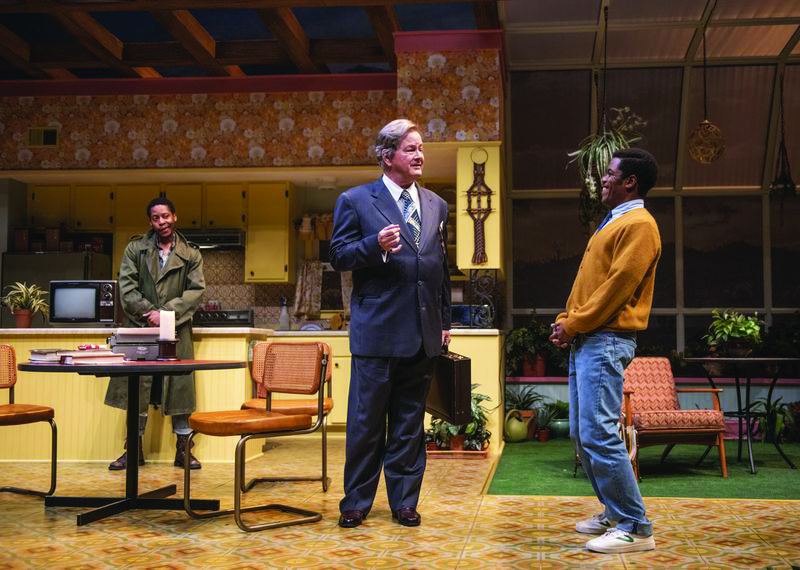True West Review
July 23, 2019
Chuck Sipps and Abbey Cruse attended “True West” at Steppenwolf. What follows is their conversational review of the show.
Chuck- So Abbey, we saw “True West.” What did you think about it?
Abbey- Well. Truthfully at first, I thought it was a little mundane, just in terms of the setting and small cast. But as I thought about it afterward, its meaning kind of opened up to me and I realized just how profound it is–how much symbolism and thematic material is packed in there. Can I ask you what your first impression was?
C- I can see what you’re saying. I think that choice was made deliberately, to lull the audience into a sense of security and expectation. The play starts as a typical drama about familial dysfunction until it morphs into more. I viewed it more as a commentary of man’s search for meaning and our unwillingness to settle for less than our ideals. I know you had a different view of it though.
A- I did. I saw the play through the lens of “masculinity” and how our definitions of masculinity can be toxic when taken too far. I think the central characters–Lee and Austin–are both victims to our culture’s masculine ideals, which I’m sure were passed down from their miscreant father. They abandon their morals; I suppose Austin is a sharper example of this, as he leaves his family. The brothers pursue our culture’s masculine ideals of physical domination and monetary success to an extreme degree, and to disastrous results.
C- That’s interesting. I viewed Lee’s struggles less to achieve success but more to achieve freedom. He wants to be free and tries to live a life of freedom without money, but soon realizes that to be a fruitless life. He then decides that if he has money he can be left well and truly alone. That, I suppose, is the beauty of art, that we can both reach such different conclusions as to what the art means. As you said earlier, the play featured a rather small cast of just four actors with Namir Smalloood’s Lee and Jon Michael Hill’s Austin dominating much of the stage time. Of the two leads which did you find the most compelling?
A- I was most compelled by Hill’s Austin. He certainly went through a drastic internal journey through the course of the play. He almost plays two distinct characters: the straightlaced Austin who is a promising up-and-coming screenwriter and the Austin whose path is thrown into question. Austin at the beginning at the play is so starkly different from Austin at the end of the play, and that was what I found so intriguing and so disturbing about his character. Which of the brothers spoke the most to you?
C- That’s difficult to say. I remember our conversation during the intermission when I said that Austin’s act one arc was a bit bland but I felt that he would be due for a stronger turn in act two. While that did turn out to be the case, I feel Smallwood’s Lee was the most dynamic throughout the play and for that, I have to give the nod to him. Lee can really stray into unlikeable territory very quickly and I feel Smallwood was able to stray that line perfectly. Speaking of playing a role perfectly, I felt that Francis Guinan’s Saul was played to perfection. I was especially interested to learn that he played the role during the original 1982 Steppenwolf run. I wonder what changes he brought to the role and how it must feel to revisit a character?
A-Yes! I was fascinated by that too! Actually, my first reaction was, “he was way too young to play Saul in 1982,” because now he seems like the perfect age. I’m not sure Guinan’s age, but he has definitely got some life under his belt, and that seems crucial to the character–someone who has been in the film industry for a long time and is passionate about the truth it excavates, but is sometimes corrupted by pride and money. I feel this may have seemed inauthentic being played by a younger man.
C- I can see that for sure. A lot has changed since the 1982 run, including the race of the two leads. That was extremely refreshing to see and I hope it inspires and attracts more artists and audience members to the theatre. As we saw last night, the audiences at theatres skews old and white and without embracing a larger cultural background I fear for the stagnation of the industry. Ok, Abbey final thought time. What are your final thoughts and do you recommend our readers should go see “True West”?
A- I would definitely recommend that readers see “True West,” if they are looking for something that will not hand them meaning on a silver platter, but will really make them think. They should be prepared to have some revelations in the days following the performance. What impressions would you leave readers with?
C- I really enjoyed my time with “True West”, and it is definitely a thinker. Go out and see it. “True West’ runs at Steppenwolf until August 25th.








